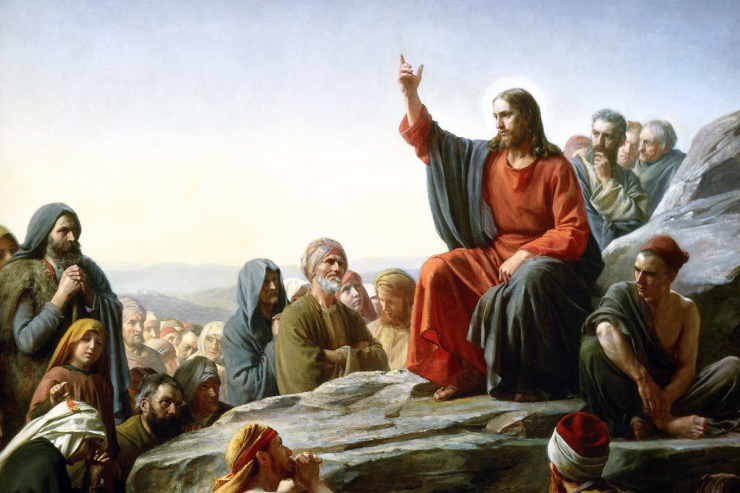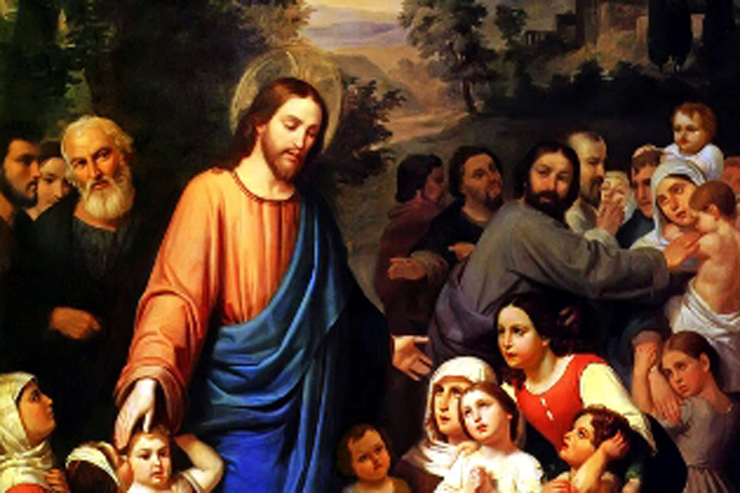
“The Sermon on the Mount” (detail)
Carl Bloch, 1890
Socrates [i] was one. Plato [ii] too. So was John Taylor Gatto [iii] of New York City. And so was dear Mrs. Corey in rural Indiana who ushered 32 second grade students happily through phonics and arithmetic for many years. The greatest of all was Jesus Himself. I’m talking about great teachers of course. They inspired their students, whether those students were formally enrolled in a class they taught or were simply those who crossed their paths.
We’ve all had good teachers. And bad ones. What makes us scurry quickly from the latter and flock to the former? I believe it is just a few characteristics or traits that just about anybody can develop. And surprisingly, these traits have nothing to do with academic credentials, intellect or measurable knowledge. What’s more, it’s not just classroom teachers who find success and the ability to relate to others when they develop these traits. Parents, coaches, employees, in short, anyone who needs to convey information to another can benefit from developing these qualities. If a person can develop just a few of these he can become a Great Teacher. If someone can develop them all, there is no telling who or what that person can inspire.
1. Great Teachers Are Humble.
Great teachers speak simply. They don’t need to impress with their knowledge. They are comfortable with what they know and eager to learn what they do not. They do not puff. As the tongue twisting adage goes, “He who knows not and knows he knows not is a wise man. He who knows not and knows not he knows not is a fool.” Great teachers are modest about their knowledge. Or as succinctly put by Saint Paul in 1 Corinthians 8:2, “If anyone supposes that he knows anything, he has not yet known as he ought to know.”
If a Great Teacher is asked a question to which he does not know the answer, he promises to find out, and then does. He knows he is not the only one able to facilitate learning. He is grateful for the opportunity to help just one person gain knowledge. Great Teachers want their students to learn, even to surpass them in knowledge. Great Teachers are never arrogant.
2. Great Teachers Are Patient
What is patience? It is the bearing of misfortune, difficulty, and annoyances without complaining, losing one’s temper or showing irritation. Great Teachers are patient with their students, no matter how many mistakes the student makes or how many times the teacher needs to explain. The wonderful thing about practicing patience is that it benefits the one practicing it as much or more as the one it is practiced upon. Being patient is indicative of self restraint and discipline and demonstrates a quality in a teacher that will likely be emulated in the student.
But patience greatly benefits the student too. When I think of tremendous patience I think of the Great Teacher Anne Sullivan [iv] teaching Helen Keller. Helen was unruly, disobedient and very closed to learning when Anne was hired to teach her. Through gentleness, perseverance -indeed patience-Anne provided an environment that coaxed Helen to reach her potential. Helen not only learned but exceeded all expectations.
Consider Helen Keller’s words, “The most important day I remember in all my life (emphasis mine) is the one on which my teacher, Anne Mansfield Sullivan, came to me.” What gratitude in a special student patience has wrought, and what learning! It is unlikely that most people will often encounter students as difficult as Helen Keller. But all will do well to remember the trait which brought about such great learning and accomplishment in Anne Sullivan’s young student- the quality of patience!
3. Great Teachers Are Kind and Show Respect.
Great teachers recognize the value and worth of each person. They try to understand their student and his perspective. They have empathy. They try to ‘get into’ the other fellow’s shoes and ‘walk a few miles’. Great Teachers esteem their students as valuable, even if they are much different than themselves, less educated or in a lower position. They recognize that they too were once in the place of apprentice. Bad teachers demand respect. Great teachers treat their students with respect and thus earn the respect of them as well.
4. Great Teachers Have Enthusiasm for Their Subject Matter.
Great teachers enjoy talking about what they teach. Whether they have one year or ten years experience, great teachers show eagerness and excitement when they approach their topics. They speak with enthusiasm, even wonder. They may have been teaching 7th grade math for 35 years, or have been working in accounting since 1975 but they approach imparting their knowledge with the same fervor as when they first began when they are trying to help someone else along.
5. Great Teachers Show Not Tell.
Great teachers may explain a concept but they demonstrate it too. They look for ways to bring examples in the classroom, board room, studio or basketball court. When they are not able to bring in examples they draw pictures or diagrams. They think of other creative ways to express knowledge and aid in their students’ understanding.
6. Great Teachers Learn from Their Students.
Great Teachers know they do not know everything. Part of what makes them great teachers is that they too are willing to learn. They are not threatened by a student’s thoughtful question or outstanding aptitude. They do not take it personally when a student asks ‘why’, wants more information or challenges a fact. They know that real learning occurs when people question, think and make a subject their own. They know they are encouraging learning for a lifetime, not just for a semester grade, one athletic event or one company presentation. Great Teachers are life-long learners themselves. They gain knowledge and wisdom from those they teach.
7. Great Teachers Are Positive; Great Teachers Smile
Great Teachers believe in themselves. They believe in others. They look for the best in both and their attitude reflects it. They are positive, not negative. Great Teachers also smile.
Mr. Harekrushna Behera, Unchahar, a teacher and personal tutor wrote in Teacher, Do You Smile? “(A) smile is the expression of love. It’s the magnet, which pulls all towards it…Everybody wants a smile… A teacher touches the heart of a student through the magnetic touch of smile. (A) smile creates confidence …(and learning) happens only when students start liking…the teacher. ..” [v]
Smiling offers many benefits. It makes one look more attractive. It can alter one’s mood. Scientists speculate it can relieve stress and possibly boost the immune system. But one really good reason for a teacher to smile is that it is contagious and conveys a message of personal bonding and encouragement. This facilitates just the right learning environment for most people. This is why Great Teachers smile.
8. Great Teachers Engage their Students.
Great Teachers know that knowledge is not like a liquid to be poured into one’s mind. Obtaining knowledge and understanding is an active not passive process. Great Teachers stimulate creativity. They are excellent communicators. They tell stories. They listen. They maintain eye contact. They don’t just lecture or throw facts at their pupils. Great Teachers engage their students.
9. Great Teachers Have High Expectations.
Great Teachers don’t believe that learning is only for a select few. They are not elitist. They understand that God’s gift of knowledge and understanding is for everyone. They recognize that while not everyone has outstanding aptitude in music, or art or golf or math or financial statement preparing, that nearly everyone can learn and usually achieve much more than they originally imagine they can.
Great teachers help their students see that they are capable. They never ‘dumb down’ a course but do look for ways to make complex material easier to understand out of courtesy towards their students. Great Teachers are realistic in their expectations, but also know that expectations are often set too low for most people.
Norman Vincent Peale said “We tend to get what we expect.” Lady Bird Johnson once said, “Children are apt to live up to what you believe of them.” I would add that other people do too. Great Teachers expect a lot from their students. And because they are great in so many other ways, they usually get it.
10. Great Teachers Provide a Warm Environment and Allow Their Students to Make Mistakes.
Great Teachers realize that mistakes often precede great learning. Thomas Edison once said of his many failed attempts to prove something, “I am not discouraged, because every wrong attempt discarded is another step forward.” Great teachers understand this too.
Against the backdrop of a supportive environment, Great Teachers encourage risk- taking and accept errors. The Great Teacher Coach encourages the young athlete to take the shot. Who knows if he might make it? The Great Music Teacher lets the young pianist try a harder piece that he aspires to learn. Perhaps the teacher’s initial assessments are wrong and he is capable. The Great Parent Teacher is probably the most important teacher of all. He allows his children to make choices and live with the consequences. He knows that experience often provides more memorable lessons than lectures ever could.
Great teachers do not say things like, “You’re not really cut out for this.” “This is not your thing.” They realize that students soon learn their own limitations and do not put false ceilings up for them.
Finally, an article about Great Teachers would be remiss in not mentioning a few points about greatest of all teachers, Jesus Christ. Look how He taught:
- Jesus, the ultimate Great Teacher, gave everyone a chance. Think of the tax collectors and prostitutes. Surely there is hope for those who some perceive as the least able or willing of students.
- Jesus spoke the Truth in humility and straightforwardness. Surely all students deserve to be spoken to in the same way.
- Jesus taught by example. Example is the most powerful teaching tool of all.
- Jesus told stories with lessons. We call them parables.
- Jesus said “Let the children come to Me.” He made time for the youngest people.
Most importantly, the teachings of Jesus, the Great Teacher, elicit an important fact that all should remember: Knowledge is nothing without its companion, wisdom, and wisdom comes from God.
To be a Great Teacher, then, one can work to develop the ten traits listed above. As the capstone to this, it is good to emulate Jesus Himself, the Greatest Teacher, and to remember “I can do all things in Him (Christ) who strengthens me.” (Philippians 4:13)
Following these guidelines, anyone in a position to help others learn in business, school, athletics or any other category in the “real” world can, with some focused attention, develop the necessary traits to be a Great Teacher.
Footnotes
[i] http://www.catholic.org/encyclopedia/view.php?id=10923
[ii] http://www.newadvent.org/cathen/12159a.htm
[iii] John Taylor Gatto was named New York State Teacher of the Year after being named New York City Teacher of the Year on three occasions: http://www.johntaylorgatto.com/aboutus/john.htm
[iv] http://www.afb.org/annesullivan/
[v] http://harekrushnabehera.articlesbase.com/tutoring-articles/teacherdo-you-smile–831840.html















